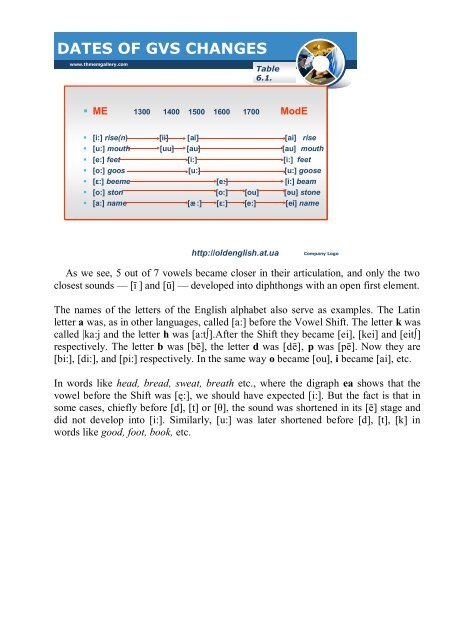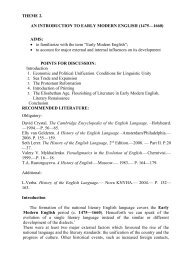SHORT VOWELS IN EModE - The History of the English Language
SHORT VOWELS IN EModE - The History of the English Language
SHORT VOWELS IN EModE - The History of the English Language
Create successful ePaper yourself
Turn your PDF publications into a flip-book with our unique Google optimized e-Paper software.
DATES OF GVS CHANGES<br />
www.thmemgallery.com<br />
Table<br />
6.1.<br />
• ME 1300 1400 1500 1600 1700 ModE<br />
• [i:] rise(n) [ii] [ai] [ai] rise<br />
• [u:] mouth [uu] [au] [au] mouth<br />
• [e:] feet [i:] [i:] feet<br />
• [o:] goos [u:] [u:] goose<br />
• [ε:] beeme [e:] [i:] beam<br />
• [o:] ston [o:] [ou] [әu] stone<br />
• [a:] name [æ :] [ε:] [e:] [ei] name<br />
http://oldenglish.at.ua<br />
Company Logo<br />
As we see, 5 out <strong>of</strong> 7 vowels became closer in <strong>the</strong>ir articulation, and only <strong>the</strong> two<br />
closest sounds — [ī ] and [ū] — developed into diphthongs with an open first element.<br />
<strong>The</strong> names <strong>of</strong> <strong>the</strong> letters <strong>of</strong> <strong>the</strong> <strong>English</strong> alphabet also serve as examples. <strong>The</strong> Latin<br />
letter a was, as in o<strong>the</strong>r languages, called [a:] before <strong>the</strong> Vowel Shift. <strong>The</strong> letter k was<br />
called |ka:j and <strong>the</strong> letter h was [a:t∫].After <strong>the</strong> Shift <strong>the</strong>y became [ei], [kei] and [eit∫]<br />
respectively. <strong>The</strong> letter b was [bē], <strong>the</strong> letter d was [dē], p was [pē]. Now <strong>the</strong>y are<br />
[bi:], [di:], and [pi:] respectively. In <strong>the</strong> same way о became [ou], і became [ai], etc.<br />
In words like head, bread, sweat, breath etc., where <strong>the</strong> digraph ea shows that <strong>the</strong><br />
vowel before <strong>the</strong> Shift was [ę:], we should have expected [i:]. But <strong>the</strong> fact is that in<br />
some cases, chiefly before [d], [t] or [θ], <strong>the</strong> sound was shortened in its [ē] stage and<br />
did not develop into [i:]. Similarly, [u:] was later shortened before [d], [t], [k] in<br />
words like good, foot, book, etc.




